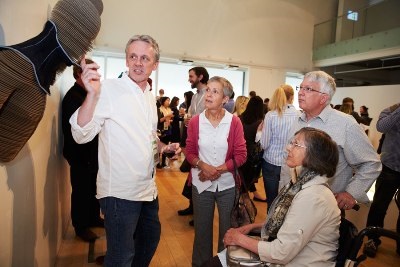Jul 31 2013
A revolutionary new device to replace ‘hated’ neck support collars for Motor Neurone Disease (MND) patients has been developed.
Imagine being unable to support your own head, unable to speak properly or eat without assistance. That is the reality for patients with MND; enabling the continuation of the most basic aspects of living such as being able to maintain eye contact with other people can dramatically improve quality of life.

From left to right, Heath Reed, Principal Industrial Designer on the Head-Up Project, Jane Evans, Regional Care Advisor for the Motor Neurone Disease Association, Moya Briggs and her husband John Briggs - examining the new collar at the recent Design4Health Exhibition at Sheffield Hallam University.
Moya Briggs, 67, who was diagnosed with the less aggressive form of MND four years ago, chose to take part in a unique patient-led project, called ‘Head-Up’ to create a more suitable collar for patients with MND.
Moya said: “I hate the current collar I have to wear, absolutely hate it. When I’m wearing it I feel like an Egyptian mummy, all choked around my neck. For it to give me enough support I’ve got to have it really tight and when it’s tight I feel like I’m choking in it. It makes me feel as if I’m only partly communicating with the world.
“I hate the look of my current collar too and I cover it with a scarf. The fact that this new collar is inconspicuous and comfortable will make all the difference.”
The award-winning ‘Head-Up’ project is funded by the National Institute for Health Research (NIHR) Invention for Innovation (i4i) Programme. It is a collaboration between Sheffield Teaching Hospitals NHS Foundation Trust, the University of Sheffield and Sheffield Hallam University. The team was brought together and provided with early funding by the NIHR Devices for Dignity Healthcare Technology Co-operative (D4D HTC).
The collar came from a complete rethinking of existing collars as it sits low on the patient’s neck and offers support along the contours of the neck muscles, making it much easier for patients to carry out everyday tasks such as eating and communicating. The new collar will be undergoing a comprehensive evaluation later this year.
The involvement of patients and the public in research has been strongly promoted by NIHR, and is at the heart of D4D’s culture. Moya and other MND patients have played an extensive part in the design workshops for the new collar.
She said: “The whole device is very inconspicuous and provides so much more support. The snood itself feels like a second skin. It was wonderful for me because the muscles at the back of my neck usually feel the strain but I could instantly feel the relief in my neck.”
“I think it’s going to be a great relief to a lot of people. Every time I go out I will be wearing it and I need it for when I’m on the computer or if I’ve got to sit at the table or do anything for a long period of time.”
D4D, which is hosted by Sheffield Teaching Hospital NHS Foundation Trust, brought together an extensive multidisciplinary team including designers and engineers from Sheffield Hallam University’s Lab4Living, clinicians, clinical neurologists, MND nurse specialists, occupational therapists, physiotherapists and medical engineering experts from the University of Sheffield and Sheffield Teaching Hospitals.
This group was supported by MND patients and carers through the Motor Neurone Disease Association. D4D is also leading the regulatory compliance, evaluation and commercialisation work to put the collar as quickly and effectively as possible into the hands of patients.
Moya said: “I think the role that initiatives such as the NIHR D4D HTC play is very important. They can add an extra dimension – bringing forward products which integrate modern materials and help make people feel more part of the community and less obviously disabled.”
The project was led by Dr Christopher McDermott, who is a Consultant Neurologist and a Co-Director at the Sheffield MND care centre and also supported by the Motor Neurone Disease Association (MNDA).
Source: http://www.sth.nhs.uk/